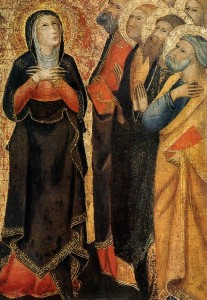 The poetic text of Jesu, Nostra Redemptio sets the stage for articulating our Christian journey following the path set out by Our Lord in following Him. This text is truly an Ascension Thursday text. This journey of faith in following Jesus is a central aspect of our Christian faith that bespeaks of our desire to live in hope. The great Mother of our Savior and the apostles in the image recognize the accent of truth that is in the Divine Person of Jesus.
The poetic text of Jesu, Nostra Redemptio sets the stage for articulating our Christian journey following the path set out by Our Lord in following Him. This text is truly an Ascension Thursday text. This journey of faith in following Jesus is a central aspect of our Christian faith that bespeaks of our desire to live in hope. The great Mother of our Savior and the apostles in the image recognize the accent of truth that is in the Divine Person of Jesus.
Ascension Thursday has a sadness to it, as the disciples part with Christ’s bodily presence among them even with the promise that the Great Comforter will be sent. It sounds strange to say “sadness” viz. the joy of the resurrection. As one theologian-friend said of the liturgical texts of the Byzantine Church, the Ascension has its “deepest theology of the feast in its Kontakion (…You ascended in glory, O Christ our God, not being parted from those who love You, but remaining with them and crying: “I am with you and no one will be against you!”). And yet, “parting is such sweet sorrow!”
Christians have an extended journey of conversion to make each year with Lent and then Eastertide, a time more intensely filled with anticipation and longing for the Divine Presence. Eastertide is not a spiritual time of standing back from spiritual work after Lent is over, but these 50 days are a new and intense phase of the Christian journey. One just has to think of the scriptures we heard proclaimed at Mass and the Divine Office during Easter. Nonetheless, the following text of Jesus our redemption sheds light and hope.
Jesu, nostra redemptio,
Amor et desiderium,
Deus Creator omnium,
Homo in fine temporum.
O Jesus, our redemption,
our love, and our desire,
God, Creator of all things,
become Man in the fullness of time.
Quae te vicit clementia,
Ut ferres nostra crimina,
Crudelem mortem patiens,,
Ut nos a morte tolleres!
What tender love, what pity
compelled Thee to bear our crimes,
to suffer a cruel death
that we, from death, might be saved?
Inferni claustra penetrans,
Tuos captivos redimens,
Victor triumpho nobili
Ad dextram Patris residens:
Into death’s dark cloister didst Thou descend,
and from it captives free didst bring;
Thy triumph won, Thou didst take Thy place,
Thou, the Victor, at the Father’s right.
Ipse te cogat pietas,
Ut mala nostra superes,
Parcendo, et voti compotes
Nos tuo vultu saties.
‘Twas a tender love, a costly compassion
that pressed Thee our sorrows to bear;
granting pardon, Thou didst raise us up
to fill us full with the splendour of Thy face.
Tu esto nostrum gaudium,
Qui es futurus praemium:
Sit nostra in te gloria
Per cuncta semper saecula.
Thou art already the joy of all our days,
Thou Who in eternity will be our prize;
let all our glory be in Thee,
forever, and always, and in the age to come.
The English text is translated by Fr Mark Daniel Kirby, OSB.